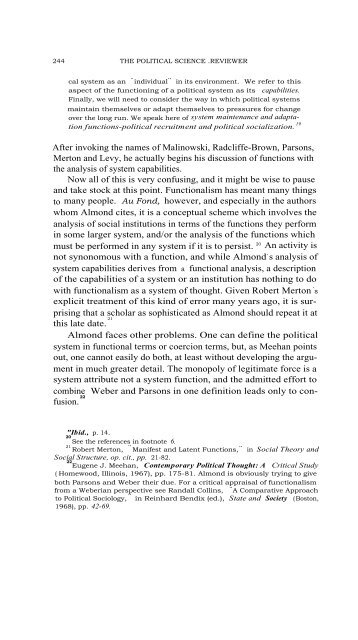FUNCTIONALISM AND ITS CRITICS - Intercollegiate Studies Institute
FUNCTIONALISM AND ITS CRITICS - Intercollegiate Studies Institute
FUNCTIONALISM AND ITS CRITICS - Intercollegiate Studies Institute
You also want an ePaper? Increase the reach of your titles
YUMPU automatically turns print PDFs into web optimized ePapers that Google loves.
244 THE POLITICAL SCIENCE .REVIEWER<br />
cal system as an " individual " in its environment. We refer to this<br />
aspect of the functioning of a political system as its capabilities.<br />
Finally, we will need to consider the way in which political systems<br />
maintain themselves or adapt themselves to pressures for change<br />
over the long run. We speak here of system maintenance and adaptation<br />
functions-political recruitment and political socialization. 19<br />
After invoking the names of Malinowski, Radcliffe-Brown, Parsons,<br />
Merton and Levy, he actually begins his discussion of functions with<br />
the analysis of system capabilities.<br />
Now all of this is very confusing, and it might be wise to pause<br />
and take stock at this point. Functionalism has meant many things<br />
to many people. Au Fond, however, and especially in the authors<br />
whom Almond cites, it is a conceptual scheme which involves the<br />
analysis of social institutions in terms of the functions they perform<br />
in some larger system, and/or the analysis of the functions which<br />
must be performed in any system if it is to persist. 20 An activity is<br />
not synonomous with a function, and while Almond ' s analysis of<br />
system capabilities derives from a functional analysis, a description<br />
of the capabilities of a system or an institution has nothing to do<br />
with functionalism as a system of thought. Given Robert Merton ' s<br />
explicit treatment of this kind of error many years ago, it is surprising<br />
that a scholar as sophisticated as Almond should repeat it at<br />
this late date. 21<br />
Almond faces other problems. One can define the political<br />
system in functional terms or coercion terms, but, as Meehan points<br />
out, one cannot easily do both, at least without developing the argument<br />
in much greater detail. The monopoly of legitimate force is a<br />
system attribute not a system function, and the admitted effort to<br />
combine Weber and Parsons in one definition leads only to confusion.<br />
22<br />
"Ibid., p. 14.<br />
20<br />
See the references in footnote 6.<br />
21 " "<br />
Robert Merton, Manifest and Latent Functions, in Social Theory and<br />
Social Structure, op. cit., pp. 21-82.<br />
22<br />
Eugene J. Meehan, Contemporary Political Thought: A Critical Study<br />
( Homewood, Illinois, 1967), pp. 175-81. Almond is obviously trying to give<br />
both Parsons and Weber their due. For a critical appraisal of functionalism<br />
from a Weberian perspective see Randall Collins, " A Comparative Approach<br />
to Political Sociology, " in Reinhard Bendix (ed.), State and Society ( Boston,<br />
1968), pp. 42-69.
















